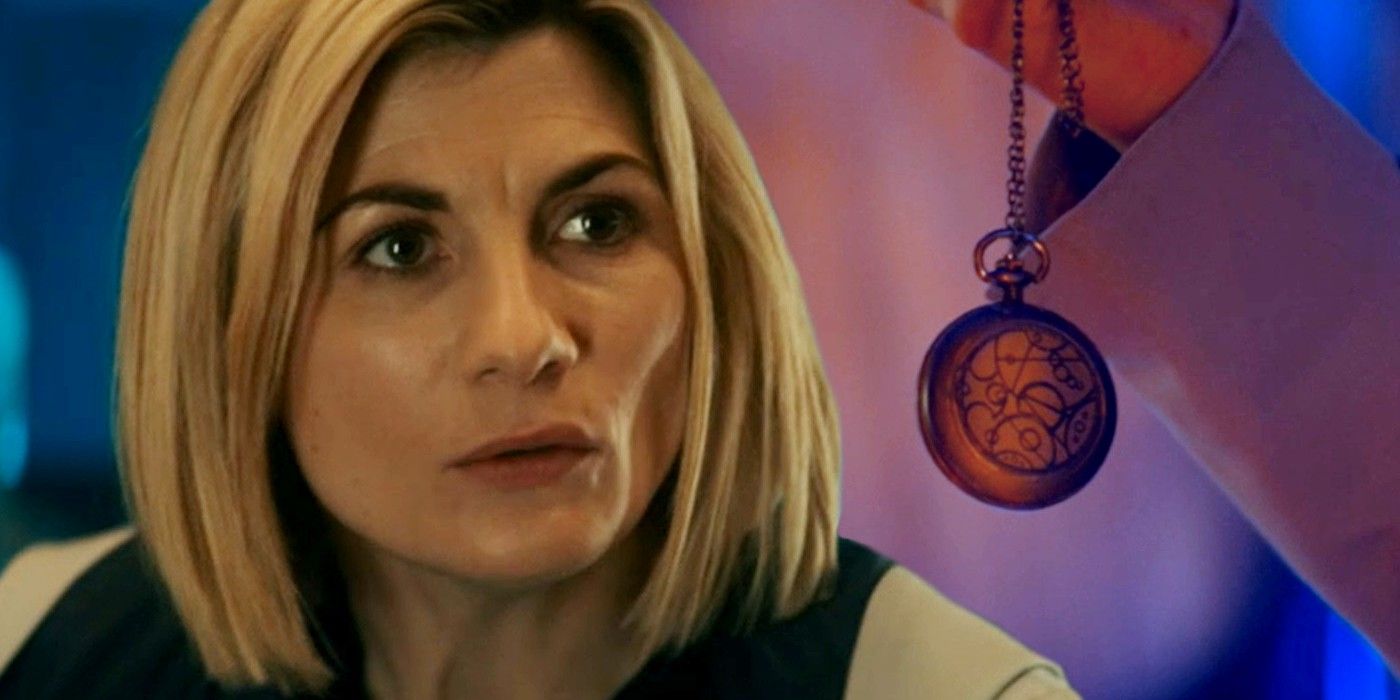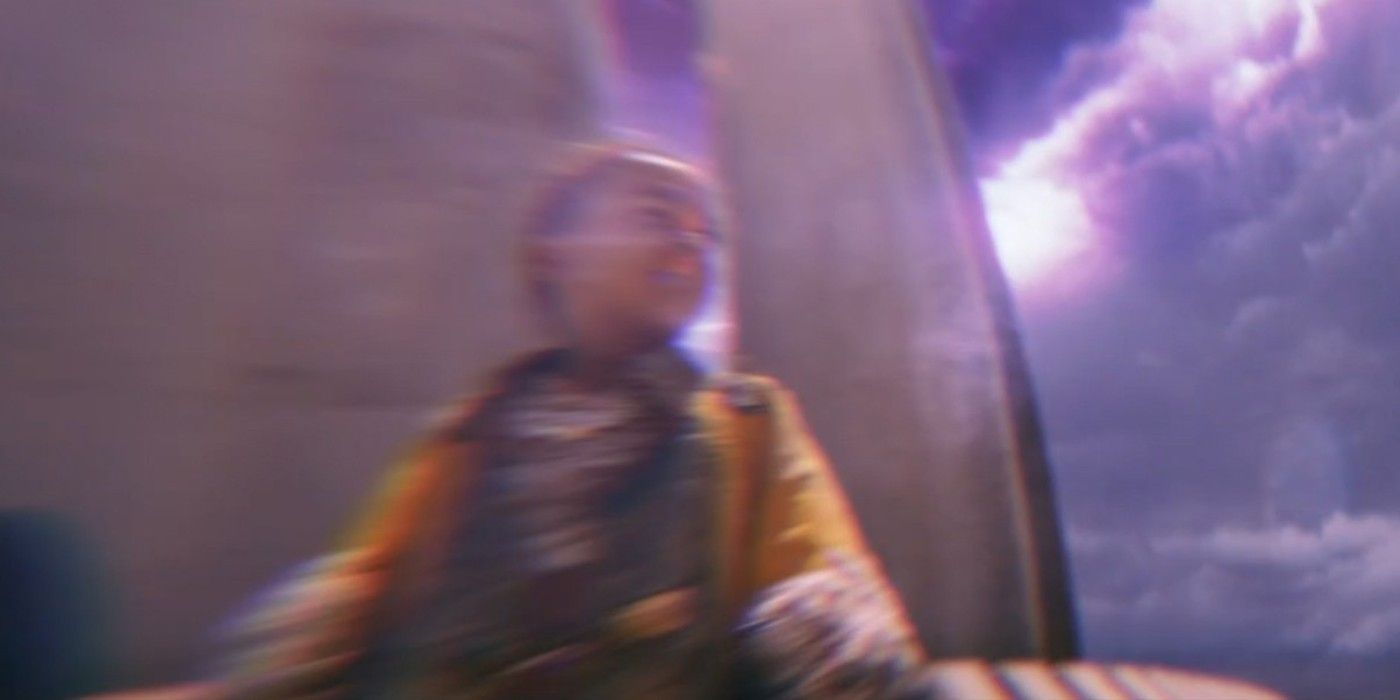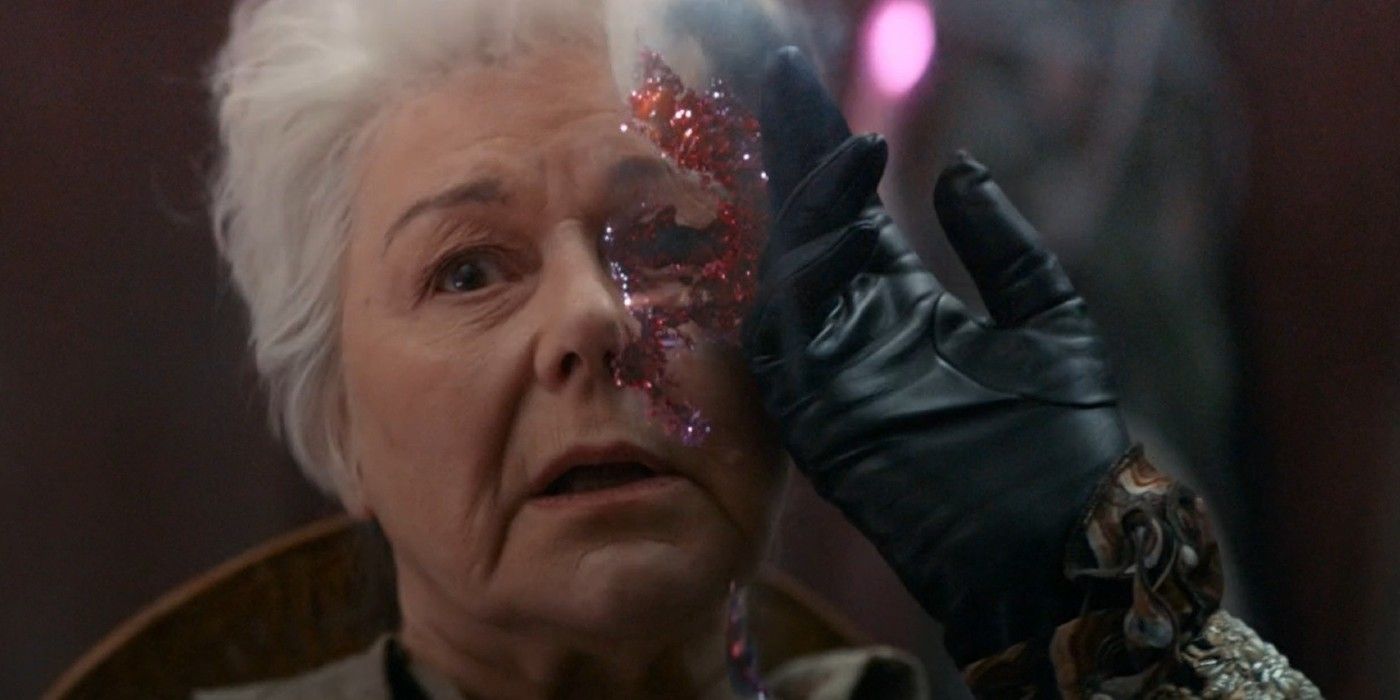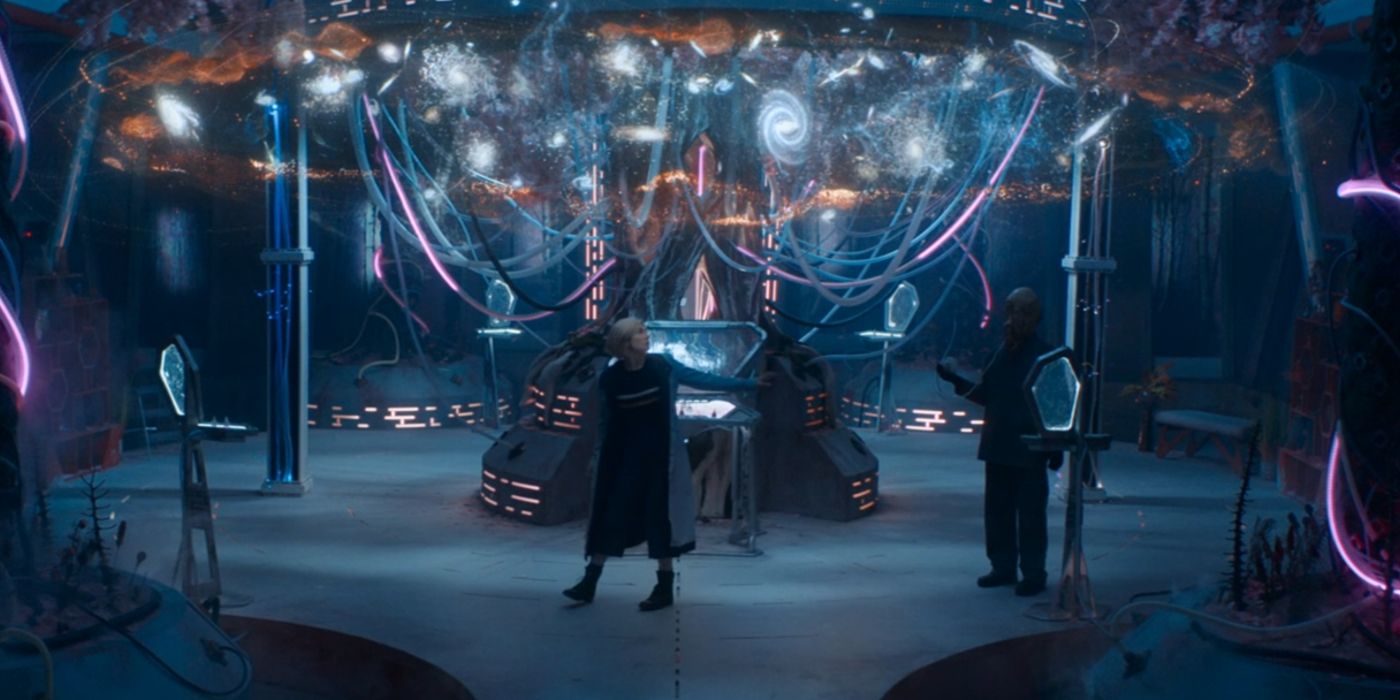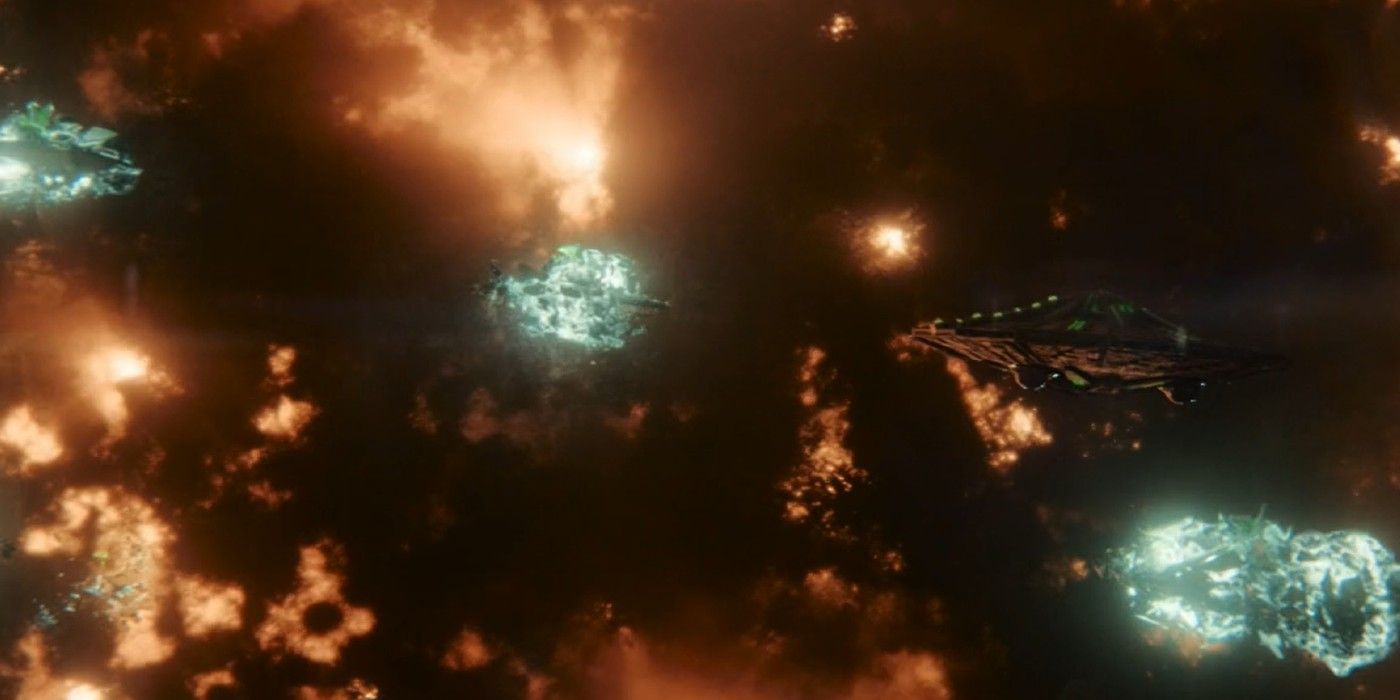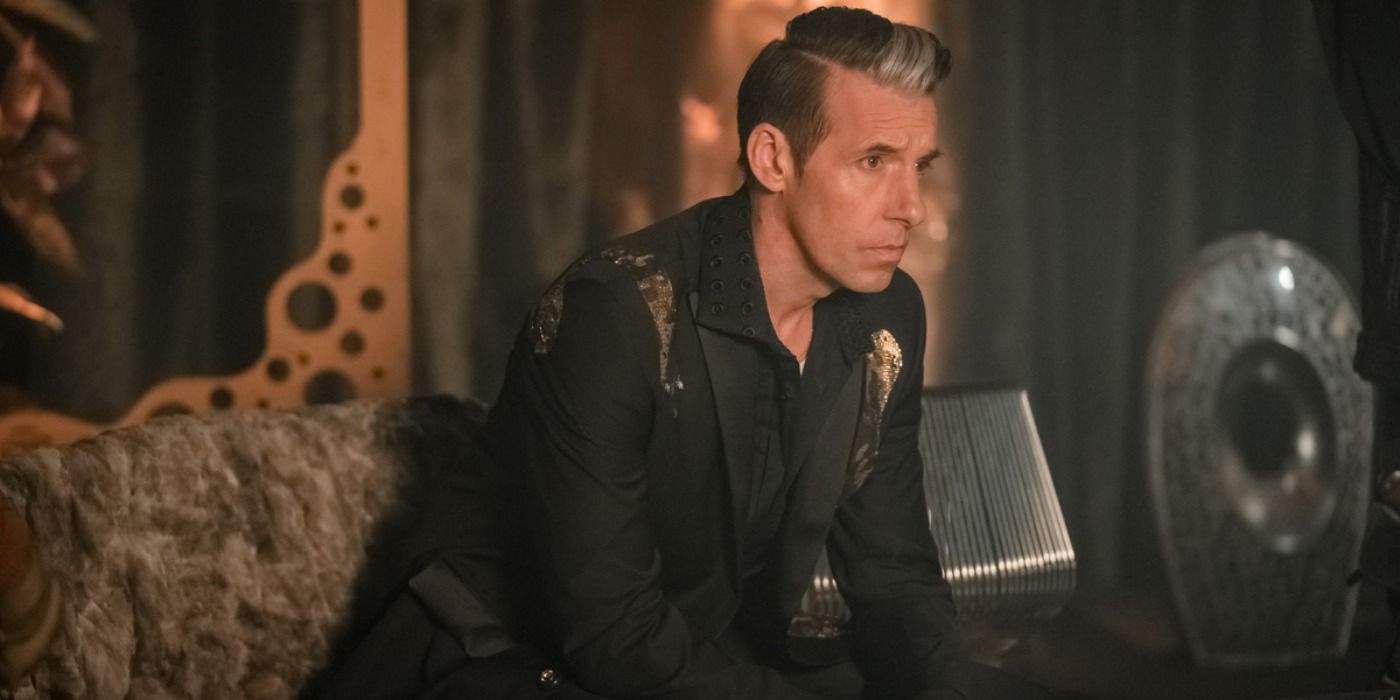The final episode of Doctor Who: Flux fails to answer many of the big questions set up throughout its six-part storyline - here's everything left unresolved ahead of The Doctor's 2022 adventures. As Jodie Whittaker's final full season piloting the TARDIS - and Chris Chibnall's final full season piloting Doctor Who - Flux felt like a culmination of everything the current regeneration had been working toward. Season 12's Timeless Child shockingly rewrote The Doctor's heritage, and Doctor Who: Flux promised to address the finer points of that revelation. On top of The Doctor's personal business, the small matter of a universe-ending event added more mysteries to untangle.
While Doctor Who: Flux does elaborate upon the Timeless Child, Division, and the Ravagers, very little is truly solved by the end of season finale, "The Vanquishers." The closing hour is a relentless blizzard of exposition that neglects meatier mysteries in favor of blowing up Sontarans, running away from snakes, and finding a way for Jodie Whittaker to be in three places at once.
In some cases, Doctor Who is clearly dragging out storylines until Whittaker's departure, and the trio of special episodes scheduled for 2022. Other unanswered queries, however, leave Doctor Who: Flux frustratingly incomplete - heavy on setup, but light on end product. Here's every major plot point Doctor Who: Flux leaves abandoned like an old companion.
The Timeless Child - Where Did The Doctor Come From?
By far the most pressing mystery walking into Doctor Who: Flux was The Doctor's origin. The Timeless Child arrived in our universe through a wormhole and was immediately adopted by the people of Gallifrey, who exploited her unique cellular regeneration to establish themselves as Time Lords. Thus, The Doctor's species and planet of origin remained completely unknown - and Doctor Who: Flux does absolutely nothing to change that.
In fact, The Doctor's reunion with Tecteun only muddies the waters, as a frantic Whittaker points out how Tecteun didn't technically see her emerge from the wormhole, meaning the Timeless Child could've just been waiting around for her mates when a giant portal opened up by coincidence. Tecteun does at least confirm The Doctor's home universe is right next door to our own, but this doesn't meaningfully change what the audience already knows. With only a handful of episodes left in the Chibnall era (one of which will be a light festive offering), Doctor Who still hasn't addressed where the Timeless Child fell from, and why she departed one universe for another.
How Many Regenerations Of The Doctor Have There Been (& What Did They Do)?
It's not only the ancient past that Doctor Who: Flux largely ignores, but also The Doctor's time spent working for Division. Flashbacks to Jo Martin's Fugitive Doctor do unveil an old mission to the Temple of Atropos, where The Doctor was accompanied by Karvanista and two other Division operatives to take down Swarm and Azure, teasing "Ruth" as the regeneration immediately before William Hartnell. Unfortunately, Doctor Who: Flux still hasn't addressed how long The Doctor worked for Division, nor how many regenerations she burned through under its employ. Indeed, the finale skirts around this problem by having The Doctor drop her Chameleon Arch fob watch into the bowels of the TARDIS, to be dealt with at an indeterminable point in the future.
Which Past Doctor Who Events Did Division Interfere With?
Viewers already knew The Division was founded by Time Lords as a way of interfering in temporal events from the shadows, and their ruthlessly immoral approach to secrecy was also well established. Doctor Who: Flux reveals two further details about Division - who leads them, and what they want. The Doctor's own foster mother, Tecteun, has been calling the shots from her inter-universe HQ, and her intention is to end our world completely because The Doctor's antics have become too problematic. Division is upping sticks and heading to the next plane of reality - but not before using the Flux to clean up their mess.
Alas, Doctor Who's Division are far from a closed case by the time season 13 has finished fluxing. Learning the truth about Division from Tecteun, The Doctor asks, "How much did it [Division] interfere?" Tecteun replies, "Across space and time, its influence is unparalleled; its reach is unlimited." This exchange begs one question - which past Doctor Who events were Division's fault? Not necessarily something Doctor Who: Flux needed to address, Tecteun's admission can be unwrapped further down the line. Now The Doctor knows what Division does, she can look for their fingerprints on the universe's past.
Does Tecteun's Death Mean Division Is Over In Doctor Who?
Almost immediately after Tecteun's return, Doctor Who takes the odd route of killing her off. For the remainder of the story, Division is a mere afterthought, with Tecteun's death effectively excising her temporal club from Doctor Who: Flux's narrative. As Tecteun herself so keenly points out, however, Division's influence and membership are unparalleled, recruiting across all planets and timelines. Tecteun also teases another Division leader waiting in the wings, ambiguously replying to the question of her leadership with, "It's complex, but I suppose yes, right now, leadership falls to me."
Division clearly doesn't end with Tecteun's death - even if the other operatives did politely stand back and allow The Doctor to save the universe in Doctor Who: Flux's finale. Their inaction suggests Chibnall has finished playing with his Division toys for now, and there's certainly no foreshadowing of Division as a villain for the near future. On the other hand, it makes little sense for The Division to fade quietly into the night just because Tecteun got herself killed.
Hold Up, Is Doctor Who's Universe Still Destroyed By The Flux?
Er... yes? When the Thirteenth Doctor was drawing information out of Tecteun's suspiciously fickle Ood in Doctor Who: Flux episode 5, a projected 3D map showcased the damage done so far. Entire galaxies had already been wiped out, and the universe was a mere fraction of its former glory. Thankfully, all was not lost. The Doctor gleefully speculated that because the Flux had merely compressed the universe, she could harness Division's technology to decompress everything that had been lost. Having already provided the exposition, surely this would be how Jodie Whittaker saves the day?
Not quite. She halts the Flux by borrowing the Sontarans' anti-matter strategy, absorbing Division's destructive wave and preventing any further universal dents... but there's no mention of The Doctor decompressing what was already lost. Despite Doctor Who: Flux's "well done guys, we saved the day" tone in the closing scenes, the vast majority of our universe has actually been lost - seemingly irreversibly - and the finale fails to acknowledge what should be The Doctor's biggest defeat since the Time War. Imagine if the MCU Avengers celebrated after Thanos' snap because they successfully saved half of the universe.
And The Daleks, Cybermen & Sontarans Are Gone Too?
The remaining post-Flux Dalek, Cybermen and Sontaran forces hid behind Earth's shield as the wave approached. The potato villains betrayed their new "allies" and lowered the shield so both rival races got caught in the destruction, but The Doctor and Karvanista seized control and exposed the Sontarans also, allowing all three races to perish. Putting the genocidal implications to one side, that means the Daleks, Cybermen and Sontarans are, for now, gone from Doctor Who. Before the slaughter, a Dalek voice specifies, "All Dalek battalions are aligned here" and the Cyberman leader follows up with, "Cyber battalions are amassed." At the very least, Doctor Who: Flux destroys most of the universe's Daleks, Cybermen and Sontarans.
All three villainous races will, of course, be fine. If the Daleks survived the Time War, they can survive the Flux and, sure enough, the murderous pepper pots are back on festive duties for Doctor Who's 2022 New Year's Day special, meaning not every Dalek was present in Flux's finale. As for the Cybermen, Doctor Who's Tennant and Capaldi eras already established the Cybermen as a naturally recurring event. No matter the period or location, Cybermen are inevitable, so they'll be back before long too. The Sontarans might take longer to regroup, but their cloning reproduction means the Flux hasn't killed Sontar's warriors permanently.
Who Was Doctor Who: Flux's Grand Serpent?
Craig Parkinson's Grand Serpent brings all the ingredients of a fantastic Doctor Who villain - deliciously creepy, utterly despicable, and kills using a mouth snake. Originally a dictator, the Grand Serpent was exiled (off-screen) before finding his way to 1950s Earth, where he took an interest in UNIT and manipulated its history to ensure the second Sontaran invasion of 2021 went off without a hitch. But who is this mysterious adversary, and what was his real intention on our humble planet? Doctor Who: Flux answers these questions in a single, throwaway line of dialogue when The Doctor speculates, "Let the Sontarans do the dirty work then betray them... then rule over a semi-grateful human race. How am I doing at guessing?"
Such a generic ploy doesn't match up to the Grand Serpent's grand setup, leaving many viewers suspicious that Doctor Who hides more secrets regarding his species and masterplan. Is he really just some random alien tyrant who briefly made a botched alliance with the Sontarans? Or is the Grand Serpent secretly a Time Lord - perhaps even The Master?
Who Is Time, The Ravagers' Savior?
When Swarm and Azure ravage the Temple of Atropos intending to let time run wild, they speak as if "Time" is a sentient being in its own right. Doctor Who: Flux's finale proves why. Time is a proper Doctor Who villain imprisoned in the Temple of Atropos, worshiped by the Ravagers who hoped to release it, but failed spectacularly. Capable of assuming any physical appearance, Time obliterates his incompetent servants and warns The Doctor of her impending demise, but while we now know Time is an actual character, a host of questions remain.
Is Time a primordial God-like being who ran amok? Who locked Time in the Temple of Atropos? And because The Doctor protected Atropos as a Division agent, does this mean she knew about Time (and perhaps even fought it) but the memories were erased? A connection might also exist between Time and The Doctor's original home, since it was the Timeless Child's biology that created a race called "Time Lords." Doctor Who: Flux certainly seems to be setting up this living manifestation of Time as a future enemy - providing it finds the keys to Atropos first.
Which Forces Is The Master Amassing Against The Doctor?
Time ominously hints toward "forces amassing" against The Doctor, with The Master leading their charge. Sacha Dhawan's character was tipped over the edge after learning his fated nemesis was the progenitor of the entire Time Lord race, giving him a shiny new motivation for killing The Doctor. But which "forces" is the classic villain building? Could Jodie Whittaker's regeneration scene come as the result of an almighty clash between Team TARDIS and the assembled villains of recent Doctor Who - Daleks, Cybermen, Sontarans, Weeping Angels, Stenza - all united under a common cause by The Master?

